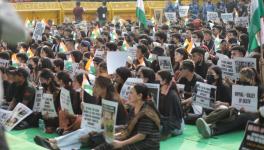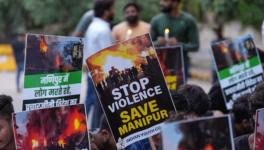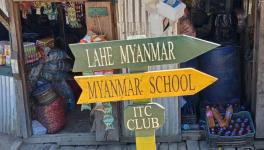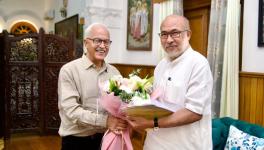Manipur was Seen as Developed in Northeast—Militant Groups Spoiled it all’
FIle Photo.
On May 4, the day after ethnic violence broke out in Manipur, a mob set afire and vandalised the Restoration Theology College (RTC) building in Imphal. Dr Satkhokai Chongloi, principal of the college, escaped the building he had called home for two decades with his family, church elders and students. A church affiliated with the Kuki Christian Church Manipur, of which he is the executive secretary, was also burnt down. S Chongloi is also secretary-general of both the Kuki INPI, apex body of the Kuki tribe, and the Kuki Organisation for Human Rights. He spoke with NewsClick during a recent visit to Delhi. Edited excerpts:
Pragya Singh: According to your information, how many churches have been attacked in Manipur since May 3?
Satkhokai Chongloi: I have two sets of numbers. One says 253, and the other says 273 churches and church quarters were burned or attacked from May 3 to June 15.
PS: One of them was yours?
SC: My Bible college [the Restoration Theology College] residence and church were completely burned down on May 4. A police complex is right behind us, next door is a Manipur Rifles complex, and the Chief Minister’s house is so close that they would have heard the mob and seen the fire. But nobody cared or did anything, and it was burned openly in the afternoon.
PS: Did you make calls seeking help?
SC: We made many calls, even when they were burning the building, but nobody came. In Imphal, the police usually arrive within 30 minutes in case of any problem. We thought that would happen even now, but it did not. The paramilitary, commandos and police were there, but mobs moved freely, doing what they wanted.
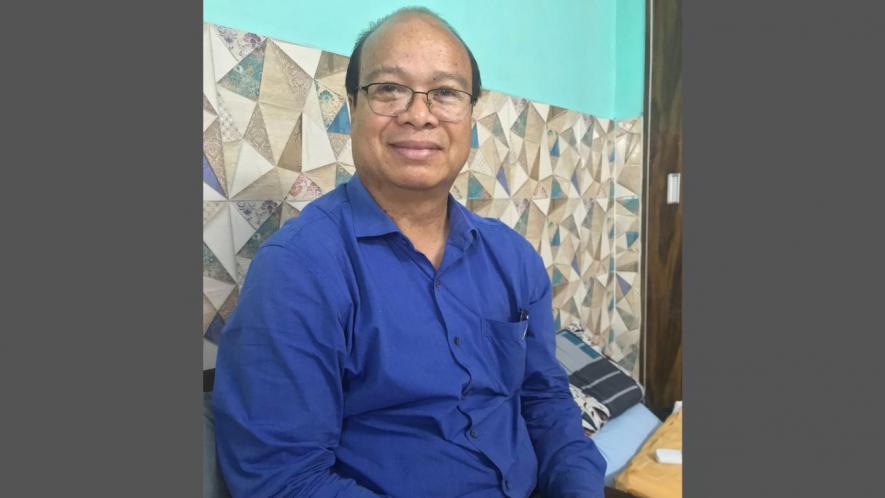
Dr Satkhokai Chongloi | Image by Pragya Singh
PS: How long have you lived there?
SC: Since 2003, I was the principal of the college, with around 20 families and 90 students living on campus.
PS: Where were you when the arson occurred?
SC: We had planned our students’ graduation ceremony on May 4, but the previous night, they started burning our surroundings in Imphal, including churches, and selectively killing Kukis. We saw fires and realised we could not hold the ceremony. We asked students to return home, but they couldn’t in that situation.
At noon, I thought we should move from that building. I told my [church] elder, ‘Brother, why don’t we shift somewhere safer?’ We have another properly fenced campus with a hospital and nursing institute five minutes away. My elder thought for a minute and said, ‘Let us move’. I immediately screamed: ‘Brothers! We need to move to the hospital campus right now—all should be there!’ Everyone packed families in cars or left on foot. We did not believe they would burn everything, so we left with just the shoes and the clothes we wore. But less than 30 minutes later, a mob came and burned everything.
PS: So you escaped at the last minute?
SC: Yes, or we would have all been killed.
PS: Were you warned to move? What made you decide?
SC: No, I believe God spoke to me, and my intuition told me we must leave. Very close to the college is the old office of ATSUM [All Tribal Students’ Union Manipur]. It was burning, so we immediately decided to shift.
PS: Did you return to your house after it was burned?
SC: The Army escorted me there on May 5. It was completely destroyed.
PS: Do you know who the attackers were?
SC: I have not seen them, but my understanding is that the people prepared [for violence] were the Arambai Tenggol and the Meitei Leepun [militant Meitei groups]. They wore black shirts and were moving freely in columns. We saw how prepared they were on TV…
PS: Before May 3, were there warnings of what was to come?
SC: We did not believe there would be such violence. The Chief Minister had been referring to hill people as ‘poppy-planters’, ‘immigrants’, etc. But if he has doubts about immigration, he has the right to send them back. I have not seen immigrants coming from Myanmar.
PS: Have you never met immigrants from Myanmar?
SC: I have met many Myanmar immigrants because, long ago, there was no partition [India-Myanmar border]. After Independence, our friends, families, and people [Kuki-Zo communities] have lived on both sides of the border.
Sometimes, the fence came up in the middle of villages, making people on either side Indian or Burmese. Even some of my uncles live there [in Myanmar] but don’t want to come to Manipur. Why? Because, for example, they wear longis and we wear pants, and they say, ‘Ah—it is uncomfortable, I don’t want to come!’ [Laughs] There are many differences, so they don’t want to come. But we freely moved anywhere when there were no proper border pillars or fencing until the 1970s or 1980s.
PS: Were remarks about poppy planters and infiltrators made before May 3?
SC: Yes, before May 3 also, it was said that all hill people plant poppy [source of the narcotic, heroin]. The fact is, Kukis and Nagas do it too, but not everybody among them.
PS: What would you do now? Return to Manipur?
SC: I am not sure because our college has not reopened, but I will return. That is my place.
PS: And to Imphal?
SC: Not to Imphal. We could not go there even if we wanted to because we would be killed. Now Kangpokpi [hill district where Kukis are more numerous] is our only place, where our church has offered shelter. We must rebuild and find a new location because things have changed in Imphal. Today, Kukis cannot even enter Kuki colonies to check if their belongings are safe.
PS: Have your Meitei friends been in touch with you since May 3?
SC: Yes. Some. But I was very uncomfortable talking to them. We don’t want to talk [to them], and they don’t want to talk [to us].
PS: But you won’t know what they think if you don’t talk. Maybe they are hesitating to contact you after all that has happened.
SC: That is true. Two weeks ago, one of our former nurses from the hospital called me, and I asked her how many people had died in this violence. She said, ‘No comment’. Actually, my question was stupid because we know how many people have died; they [Meitei] do not. We can contact people in the field and eye-witnesses, but Meitei militant groups are hiding the actual number [of casualties since May 3].
PS: Some Meitei are also caught in a very tough position.
SC: That’s right. Recently, they marched to the Chief Minister’s bungalow carrying dead bodies to show their discontent. Actually, the Chief Minister may have been behind all this. Nothing like this would have happened if he had forced the security personnel to stop things early. When Home Minister Amit Shah came to Manipur for three days, such things should have stopped automatically, but more then 10 villages were attacked. And the Prime Minister is silent, saying not a word about the violence. So, how can you believe this government? Even if the Chief Minister is ineffective or inactive, the Home Minister and the Prime Minister are still there!
PS: Do you see these attacks directed against the Kuki identity or Christian identity?
SC: It is a mix. A Tankhul [Naga] church next door was spared, but they burnt mine. However, if the violence was because of Christianity, they would have attacked churches, not houses. Here, they burned both houses and churches. Yet, they did not spare their own community’s churches. So, some religious violence also happened, like in New Lambulane [locality in Imphal], a large church was burnt, and the Arambai Tenggol raised its flag next to the cross. Later, they removed it, but they had raised it like they thought it was a victory.
When Christianity came to Manipur in the late 19th century, the hill people became Christians, but not in the Valley. The Valley people embraced Hinduism and set aside their Sanamahi [traditional deity]. Now the [Meitei] militant groups don’t want Hinduism or Christianity.
PS: They want to return...
SC: ...to their own religion, Sanamahism, which is not Christianity or Hinduism. In my understanding, some [Meitei] priests ceremonially denounced Hinduism and returned to Sanamahism.
PS: To your knowledge, do many Hindu Meiteis want to return to Sanamahi?
SC: Look, religion cannot be changed very easily. People consider changing their religion only when totally convinced about it. In Manipur, it is very difficult for Hindus to embrace Christianity or any other religion. Even 10 people can gather and build a church, on the other hand...
PS: But the congregations are small?
SC: Small, yes.
PS: Then what do you think is at the root of this violence?
SC: I am not sure. I still can’t believe such violence could happen because we have lived together for centuries. Since all facilities are concentrated in the Valley—hospitals, offices and universities—anybody who wants to work would like to shift there from the hills. Some would buy land and build houses, and we lived together, Naga, Kuki, Pangal, Meitei...
I have no idea what I did that they would look at me as a Kuki and come to kill us. On May 4, at the hospital campus, we elders agreed on a funny resolution that shows how innocent we were! We heard they would attack us that night, so we resolved that when and if they came, we would ask them to let our families, children, mums and others be moved out before they set the campus afire. [laughs]
PS: Why do you laugh?
SC: Because if the attackers came, would we have had time to speak?
PS: You’re suggesting the violence was not spontaneous.
SC: Immediately after the ATSUM rally ended peacefully on May 3, some Meitei miscreants burned the Anglo-Kuki War centenary gate in Churachandpur [district]. The Kukis got angry and retaliated as it represented 100 years of their wars against the British. But that clash occurred right there, immediately. What amazed and shocked me was, simultaneously, all villages in the foothills surrounding Imphal were burned before nightfall. It was premeditated and planned. Otherwise, how could they have suddenly mobilised wherever the Kukis live?
PS: What do you think about a separate Kuki administrative territory?
SC: In my understanding, the Meitei people already did the separation. Can I return to the Valley? Can I return and repair my house? I don’t think so.
PS: When no effort has been made so far to bring people together, how can we say they cannot live together?
SC: Even if there is an effort, think of the mentality of those who attacked us. I do not know how we can live with them.
PS: Do you feel afraid?
SC: I am not afraid, actually, but shocked by what happened. A Kuki woman married to a Meitei man was killed in a relief camp. A Meitei lady married to a Kuki man was also shot dead! On the night of May 4, Meitei [women] handed two young Kuki women in Imphal to a mob which [the family says] sexually abused and killed them. The two girls were from the H Khopibung village in Kangpokpi, and on June 12, even their village was attacked. One girl was the daughter of the chief, the other her friend. Actually, they are putting out very few numbers of casualties, only those they cannot hide...
They did not even spare young children during this violence. They have no mercy. Sometimes, the mobs were so big, like 10,000 strong, that even security forces could not stop them, and there were women in the mobs. Maybe they were [militant groups], and behind them were looters, who took everything away. In this violence, I don’t know why people looted first, then burned. We did not feel safe anywhere in Imphal. Finally, we contacted the Army, and they opened the roads and escorted us out on May 8.
PS: Did you experience such events during the clash with Nagas in 1993?
SC: At that time also, there was this feeling [of insecurity]. Some incidents like this happened then, too. My house in the hills was burned even then—this is the second time.
PS: But the two communities have lived together despite that.
SC: Now, after generations—and we still feel that pain.
PS: You say mobs identified and attacked Kukis. How? After all, locals would recognise some members of a mob. Did attackers come from elsewhere?
SC: They identified people by name, dress, and language—and with help from locals. But the militant groups also recruit young men to do such [violent] work. Later, even if you don’t want to do anything bad, you would be forced to because you are afraid of these groups.
PS: What do you think of the government’s peace committee—why was it rejected?
SC: Because it is not really a peace committee, it only has the face value of one. They did not even ask the Kukis before putting their names down. But first, the Chief Minister is the leader of these killings. And he is the leader of peace—how can he be both? They say five armouries were looted, but I understand the weapons were given. They say in some areas [attackers] came with sophisticated weapons.
Other funny things happened. In one incident, five or six villages [in the hills] were burned down, but not the church. Many Meitei [militant] attackers stayed in the church, cooked, drank wine, and beat drums. Then some Kuki people, the volunteers, came and killed them.
PS: How do you explain this? Why were they acting so bold?
SC: I can’t understand this. Was it a picnic for them? Because they came from the Valley, they were in a Kuki village in the hills they had burned, and in the ashes, they stayed on at night, eating, drinking, and making noises. That is like going to a picnic, no? To my mind, they should leave after a fight with the enemy if they call it a war.
PS: Do you think it is a war?
SC: They declared war; even the Chief Minister, the Meitei Leepun, declared war against the Kukis. We have videos of them declaring war on us.
PS: But Kukis also have arms, don't they?
SC: They have arms because, in the hills, Kukis are good hunters. We fought in both the world wars. Most of them have licensed guns. Now, you can expect them to buy some more weapons.
PS: So you believe things will not get better but worse?
SC: It will be worse, in my understanding. If they stop attacking, it will be OK because we are not warring against them. While we were in Imphal, thousands of Kukis were sheltered in camps and were being killed. They were caught by surprise. They were shot at even during evacuation. My understanding is that if Meiteis go again and again to the hill areas, more and more will die.
PS: So it is like a civil war situation?
SC: Yes, exactly. I feel pain because Manipur was considered a developed place in the Northeast. We excelled, for example, in medical education. But militant groups spoiled it all, and Kukis have suffered a lot.
PS: What do you think about the idea of separate administration being proposed?
SC: Separation has already been done.
PS: Can Kuki MLAs help?
SC: Yes, they are united right now and demanding separate administration.
PS: United and mostly in the BJP. Do you think the party is interested in helping the Kuki people?
SC: What we have not talked about so far is the Kuki militant groups. They had talks with the Central government, which asked them to support the BJP in the recent election. The militant groups forced the people to vote and support the BJP MLAs. They said they hoped the BJP would do something for Kukis. Now, what they hoped has come true—Kukis have been sent out of Imphal Valley, and their houses have been burnt. Maybe that is what they “hoped” for. The militant groups were under Suspension of Operations.
PS: You mean they had weapons with them?
SC: They forced people to vote and even threatened them.
PS: Politically, even if tribal MLAs combine in the Assembly, you are not electorally stronger than the Meitei. So what is the political solution you seek?
SC: Out of 60 Assembly seats, 10 each are for Kukis and Nagas. Instead, we should have at least 30 for hill people and 30 for the valley; 15 for Kukis and 15 for Nagas would also do.
PS: When we start allocating seats like that, everybody will say they are distinct and raise similar demands.
SC: If they give the Hills and Valley 30 seats each, some division [of representation] will be possible. We need a system in which the hills have an equal say.
Get the latest reports & analysis with people's perspective on Protests, movements & deep analytical videos, discussions of the current affairs in your Telegram app. Subscribe to NewsClick's Telegram channel & get Real-Time updates on stories, as they get published on our website.












